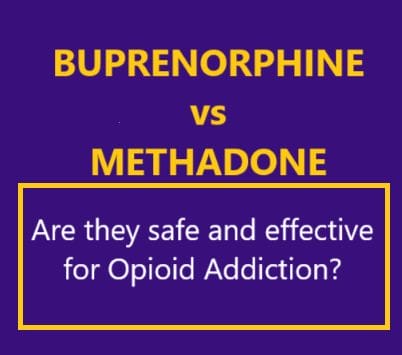Heroin is making a comeback. While that might sound like a wild exaggeration, the truth is that the highly addictive drug is more available and cheaper than ever before. Now, with more patients entering rehab for opioid dependency issues, physicians are debating which is the most effective treatment, Buprenorphine or Methadone? Both are effective, but doctors and patients should decide together which would be best on an individual basis.

A licensed doctor can prescribe Buprenorphine, but methadone is prescribed only by a specialized clinic. Sometimes doctors can prescribe Buprenorphine for pain but not for addiction treatment.
Both drugs have a substantial success rate for patients struggling with the painful and severe symptoms of opioid addiction and withdrawal. Fear of withdrawal is one common reason so many addicted individuals don’t seek treatment. Methadone and Buprenorphine can ease these physical symptoms.
Buprenorphine generic versions come in two different forms: Buprenorphine by itself and Buprenorphine + Naloxone, which is a partial opioid agonist. This means the effects of the drug are limited, even when taken in high doses. This is in contrast to methadone, which is a full agonist. It activates opioid receptors in the brain to a greater extent than Buprenorphine. That, however, can come with its own set of challenges.
Like any disease, the symptoms of addiction differ from patient to patient. One individual might respond to a particular treatment, while the same therapy will not work for another. Patients and their physicians must decide which opioid treatment is the most appropriate for their individual needs.
What are the Pros and Cons of Buprenorphine and Methadone?
- The likelihood of a fatal overdose is less with Buprenorphine than with methadone.
- Buprenorphine is less addictive and can be prescribed for use at home. Methadone, however, can easily be abused. In the early phases of treatment, patients aren’t allowed to use the drug unmonitored.
- Methadone sometimes provides better relief from opiate withdrawal than Buprenorphine. Patients recovering from a substantial opioid habit generally see greater benefits with methadone.
- In terms of financial cost, methadone is cheaper, as there are more generic brands available.
- The symptoms of Buprenorphine detoxification are commonly less severe than withdrawal from methadone.
Some experts blame the large-scale return of heroin on the medical community’s willingness to over-prescribe opioid painkillers. A study conducted by the Journal of the American Medical Association (JAMA) concluded that heroin users these days are more likely to be older, live in non-urban areas, and have previously abused prescription painkillers.
Painkillers, like Oxycontin, share a similar chemical makeup to heroin. They bind to the same receptors in the brain, produce a euphoric feeling and users develop a tolerance. Additionally, they are more expensive than heroin, and harder to find once a prescription is no longer available. This leaves individuals who might have unwittingly become addicted no choice other than migrating to the street for their opioid fix.
The National Institute on Drug Abuse estimates that more than 2 million Americans suffer from an addiction to prescription opiates, and that nearly 500,000 are addicted to heroin. Federal and state government officials across the country are considering legislation that might stem the tide of what some call the “American heroin epidemic.” In the meantime, Suboxone® and Methadone remain two effective drugs in the treatment of opiate addiction.
It’s important to note, many skeptics fear that using a drug like Suboxone® to get off of heroin is the same as trading one addiction for another. This is simply not the case. While there may be some physiological dependency, it’s not the same as addiction. The main goal for people using Buprenorphine is to get their quality of life back, so they can resume work, family life, and a normal routine.
Long-Term Buprenorphine Maintenance Therapy for Opioid Use Disorder: 2 Case Reports
Addiction is a chronic disease with significant brain changes when the addiction is to drugs like opiates and heroin. People using a maintenance program with Suboxone don’t meet the criteria for addiction.
For many people, it’s a return to normalcy and they might use Buprenorphine for many years, just like a diabetic would use insulin to maintain a healthy life. If a time comes when the patient decides they don’t need it, they can work with their doctor to properly taper off use, or possibly detox safely.
When considering the alternatives, buprenorphine or methadone are always a much better option than a dangerous addiction to opiates or heroin.
Related:
Buprenorphine Detox Treatment and Side Effects





